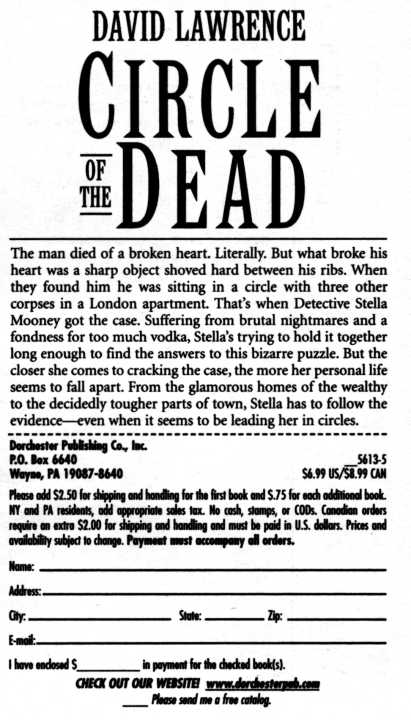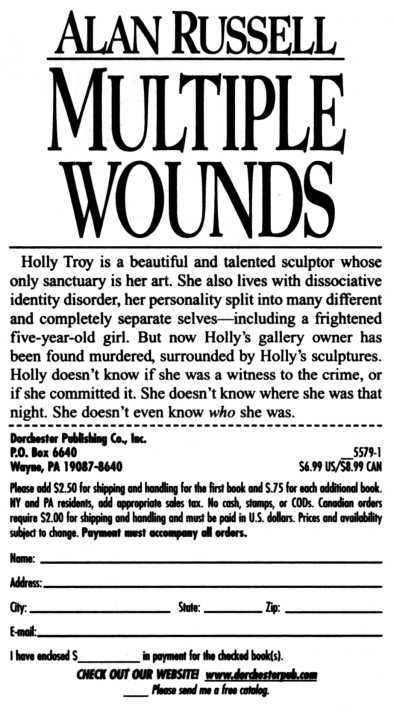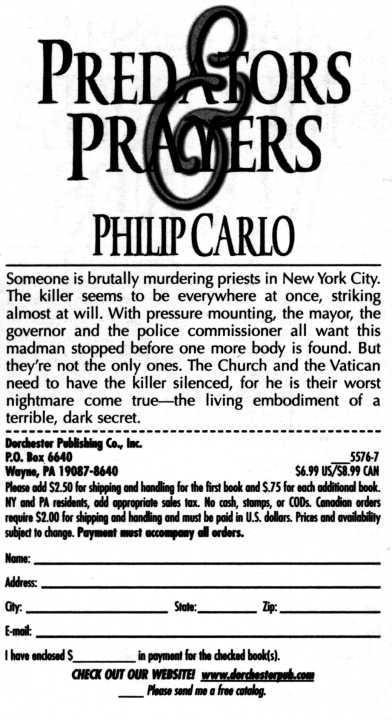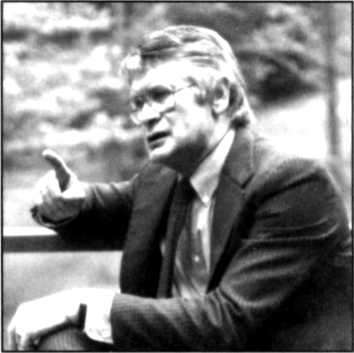On the Loose (27 page)
Authors: Andrew Coburn

"Mr. Grissom! How is he?"
"I've told him different, but he thinks he can
stay."
He cradled the phone and rubbed his brow.
Belle, staring at him, said nothing. When he
started to speak, she turned her back on him.
Bobby Sawhill napped in his old room, on what had
been Dibble's bunk and later his own. In a dream he
was a baby again, talcum on his bottom, mother's
kisses on his cheek. Each kiss had the weightlessness of a rose petal. Someone tried to roust him, but
he refused to wake up. I'm scared, Mommy, he
murmured, and his mother soothed him, neatened
his hair. He was in short pants now, though unable
to tie his shoes. Mommy did it. Someone pulled at
his arms, and his eyes snapped open.
"You don't belong here," Jason said. "And that's
my cot now, the other one's Billy's."
Bobby blinked. "Who's Billy?"
"He's new. He's me." Jason stood bare-chested
in jeans, his belly a quiltwork of muscle, his skin
darker than Bobby remembered. "I'm almost you
now," he said proudly. "Mr. Grissom's still thinking
it over."
"I won't get in your way," Bobby said softly.
"You can't stay- You're too old."
Bobby eased his legs over the edge of the cot
and sat up. The writing table, which had always
been neat, was cluttered with comic books and
girlie magazines. "I was good to you."
"I'm good to Billy."
Bobby smiled. "Do you still have treats?"
"We haven't had none for a while. Mr. Grissom
says there's been budget cuts."
"Who's the Ping-Pong champ?"
"We don't have none." Jason backed off. "I gotta
go. Mr. Grissom says you can eat in the dining hall.
You can sit at my table."
Bobby nodded. "Thank you."
"It ain't me. It's Mr. Grissom."
Alone, Bobby tidied the top of the writing table,
placing the comic books and magazines in nearequal stacks. Fishing in the drawer, he came upon
a salted cracker and ate it. He found a notepad that
had belonged to Dibble and wrote on it. After that,
he shuffled a deck of cards and played solitaire.
They drove south from Bensington and well west
of Boston, Ben Sawhill at the wheel, Chief Morgan
beside him, Reverend Stottle in the rear. The reverend had spent the morning in the nursing home
in Andover, where he had visited Malcolm Crandall's father, a diabetic who had undergone an amputation. Leaning forward, his breath on the
chief's neck, he said, "A lonely truth is a onelegged man with nowhere to go and no one to take
him there. On a bed pan he thinks he's in the driver's seat, though the only traffic is in himself."
Morgan said, "Cool it, Reverend."
Ben had not wanted him to accompany them,
but Morgan had insisted, as if the conspiracy were
still in force, their mission of mercy still a fact.
"A truth has no need of clothes. A lie dresses itself to the nines."
His hand firm on the wheel, Ben increased the
speed. "What's your point, Austin?"
"While I was visiting old Mr. Crandall the fellow
in the next bed expired. I felt privileged to be
there. The shocked eyes of the dead see everything
and nothing. In that ratified gaze lies the mystery of the universe. Astrophysicists would do well to
forget the stars and pluck those eyes out."
"Reverend, shut up," Morgan said.
"No," Ben said, `let him talk. I'm not listening."
"I think we've done your nephew an injustice."
"We've already come to that conclusion,
Austin."
"Pound for pound, an invented fear bulks bigger than a real one. A real one has a name. An invented one has a soul. That's why you acted as
you did."
Morgan, staring out at the darkening sky, said,
We almost there?"
"Almost," Ben said.
An attendant escorted them to Mr. Grissom's office. Mr. Grissom, clad in a warm-up jacket and
sweats, greeted them with professional courtesy
and solemnity. He was not happy with the situation. "We've never had a boy come back before,"
he said.
"Except for the fences," Reverend Stottle said,
"it doesn't look like such a bad place."
"I do my best."
Ben said, "Does he know we're here?"
"No." Mr. Grissom came out from around his
desk. "He's got it into his head he can stay. I hope
he doesn't give us trouble."
"Where is he?"
"In his old room. I'll take you to him." Mr. Grissom led them out of the office and down a corridor. "I can have him subdued if necessary."
"I don't think it will be," Ben said.
Mr. Grissom glanced at Chief Morgan. "Are you
armed?"
"No," Morgan said.
"I am," Mr. Grissom said, lifting the bottom of
his sweatshirt. They turned a corner and then another. Mr. Grissom opened a door and peered in.
"He's not here, sir," a voice said.
"Where is he?"
Jason rose from his bunk and lowered his voice.
"He said he wanted to talk to his pals."
"His pals? What are you talking about?"
"You know, sir." A cryptic look passed between
them. Then Jason eased forward with a slip of paper
torn from a pad. "Look what he wrote down, sir."
Mr. Grissom held the paper at arm's length.
Written in a bold hand was I forgive me. He passed
it over. "Sounds like he's coming to terms, Mr.
Sawhill. Why don't you keep it?"
They trooped down another corridor, Mr. Grissom in the lead, a bounce to his step, the others a
length behind. Reverend Stottle huffed to keep up.
Jason and an attendant had joined in. Mr. Grissom
glanced over his shoulder.
"He's in the toilets, what we call the toilets. It's
a communal washroom. If you hear him talking
and no one's there, don't be concerned. It's a
game."
Ben lengthened his stride. "I thought he was
talking to his pals."
"They're not here anymore. They're gone."
Mr. Grissom threw open the door to the toilets,
barged in, and stopped in his tracks.
Ben Sawhill gasped.
Reverend Stottle stared up at the eyes.
"Someone get a knife and cut him down," Chief
Morgan said.
Living and working in Boston, her daytime mind
constantly challenged, Trish Becker felt intellectually fulfilled. Her large pale body, however, seemed
in hibernation, wintering toward an uncertain
spring. In the spring she became involved with a
widower she'd met through a dating service. He
was quiet, unoffending, and reasonably well-off,
but each had reservations. She did not consider
him up to the mark. He doubted she would wear
comfortably. They married anyway. The overriding
factor was that each wasn't getting any younger.
Each knew panic in the night.
Gloria Eisner did not remarry. Her body had
pleased three husbands, none deserving. Her feelings for Chief Morgan, warm but ambiguous, did
not prevent her from leaving Bensington permanently when her father died. She moved to New
Jersey to be with her mother, a situation that gradually grew unsatisfactory. Each got on the other's nerves. Before another winter set in, she drove to
Key West, where her friend Barry greeted her exuberantly. "I came back for the sunset," she said. "Is
it still here?"
During a Sunday sermon Reverend Austin Stottle
caused considerable stir when he posed two questions. How many generations does God go back?
And are there monkeys in his past? A great number
of men and women in the congregation demanded
he step down, but a few loyal supporters, Ben
Sawhill among them, pointed out that he was
merely passing through one of his phases. The next
Sunday, after a long discussion with his wife, he told
the congregation that each day of the year, sunny,
stormy, whatever, was a poem written by God.
Ben Sawhill took a leave of absence from his law
firm and, avoiding mirrors in the morning because
his face didn't look plausible, grew a beard. The
twins liked it. Belle did not. The twins worried
him. They were obsessed with the thought that if
one died, the other would die twice. He was also
concerned about his relationship with Belle. They
seemed to have grown apart. "Do you blame me
for anything?" she asked, and he assured her he
didn't. She seemed unconvinced. His most peaceful times were during solitary walks in the woods,
where he visualized a world in which time could
be rewound and lives relived with a sure sense of
what to avoid, happiness a given.

Bobby Sawhill was buried next to his mother in
Burnham Road Cemetery. Mrs. Perrault, a faithful
visitor to her daughter's grave, occasionally visited
his. Exhausted, she seemed to have forgiven him,
though she still murmured, "Why?"
Mrs. Bullard's old house, standing vacant, once
again the property of the bank, caught fire one
night and burned nearly to the ground. A few in
town believed that Chief Morgan was responsible.
They claimed that Officer Floyd Wetherfield, who
owed his job to the chief, lit the match.
James Morgan, despite occasional controversy, remained police chief of Bensington.




